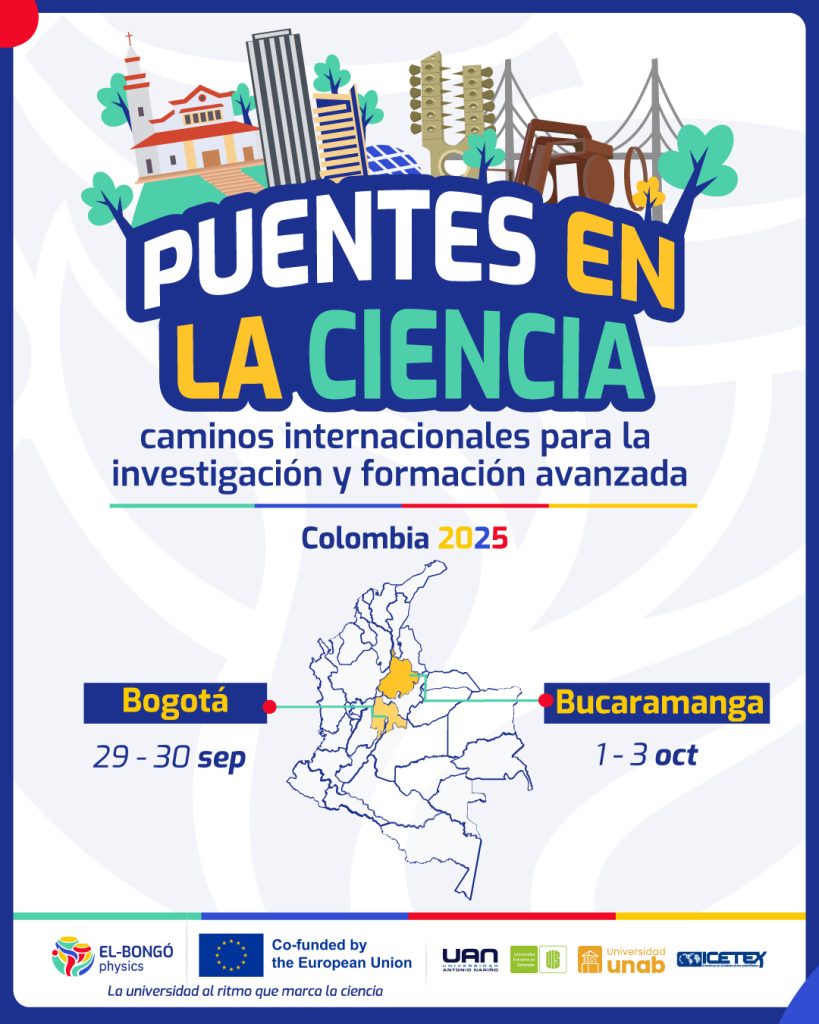Between September 29 and October 3, Colombia will host the International Meeting “Bridges in Science,” a space where fourteen universities from Latin America and Europe will come together to discuss topics related to the internationalization of research and advanced education. This event is organized by the Erasmus Project EL-BONGÓ Physics, under the coordination of Universidad Antonio Nariño, in partnership with Universidad Industrial de Santander and Universidad Autónoma de Bucaramanga, with the support of the Colombian Institute for Educational Credit and Technical Studies Abroad – Icetex.

Nearly twenty representatives from Ecuador, Peru, Venezuela, Guatemala, Honduras, and El Salvador, as well as Spain and France, in addition to Colombia, have been invited to the meeting. The agenda, which will take place in Bogotá (Universidad Antonio Nariño) and Bucaramanga (Universidad Industrial de Santander and Universidad Autónoma de Bucaramanga), will address topics such as science diplomacy, challenges in virtual education, open science, international standards for graduate programs, and science communication. There will also be keynote lectures on topics such as Artificial Intelligence, the future of Particle Physics, computational modeling, and its impact on research. All activities are open to the public and will be streamed online.
This meeting brings together, for the first time in person, the members of the EL-BONGÓ Physics Project, providing an opportunity to discuss best practices in Master’s programs in Advanced Physics and related fields in Latin America, as well as to define strategies for the international training experience for Latin American students, scheduled for 2026. As is known, the EL-BONGÓ Physics project, approved by the European Erasmus Program at the end of 2024, aims to democratize education and research in physics for the Latin American university community by designing modules that are shared across multiple master’s programs in the region—an effort that has sparked important discussions around open and collaborative science in digital environments.
For Luis Núñez, researcher at Universidad de Santander and deputy coordinator of EL-BONGÓ Physics, this meeting will help establish trust among project members. “In every collaboration it is important to share and build trust, and face-to-face interaction is what makes that possible. Many of the colleagues participating have never met in person. I was fortunate and responsible during the drafting of the project to meet virtually with all of them, but we have never shared the same physical space, and that is indispensable.” Núñez also highlighted the importance of strengthening ties between the Colombian universities participating in this ambitious project, as Colombia is the country with the most institutions involved, carrying a significant share of the responsibility: Universidad Antonio Nariño, Universidad Industrial de Santander, and Universidad Autónoma de Bucaramanga. “Our goal is to build capacity in higher education. We are driving the transformation of science education, particularly in physics, with the participation of colleagues from physics schools, physics departments, basic science departments, and also from our institutions’ social communication programs. The dialogue we are fostering in Colombia between these areas is no small feat, and now we will share this experience with peers from other countries,” he concluded.
